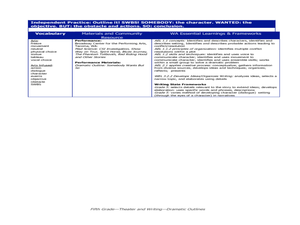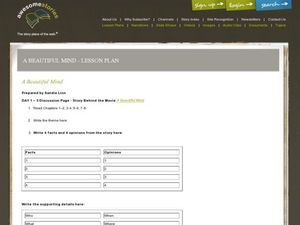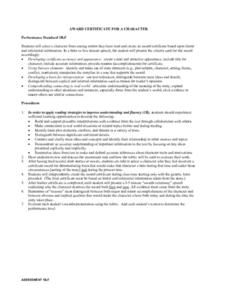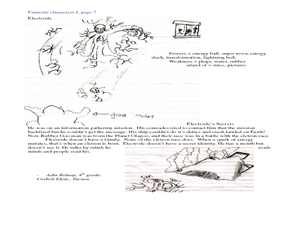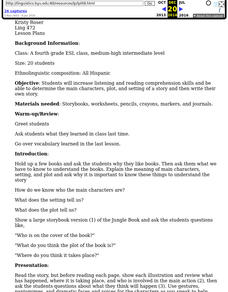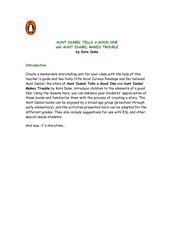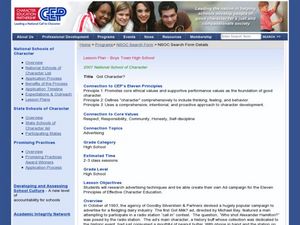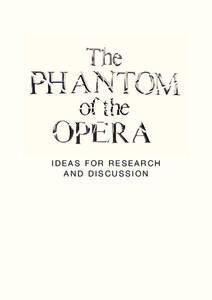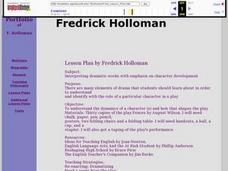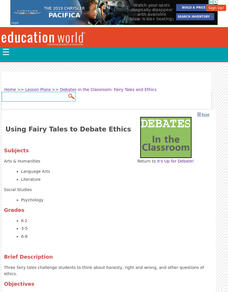Curated OER
Dramatic Outlines
Young scholars write about main characters. In this dramatic writing lesson, students brainstorm character ideas. Young scholars create actions and give the character a voice. Students act out the scene in groups and create a final draft.
Curated OER
A Beautiful Mind: Main ideas and supporting details
This activity that accompanies a reading of A Beautiful Mind includes over 20 questions that address theme, fact and opinion, supporting details, characterization, and quote comprehension.
Curated OER
AWARD CERTIFICATE FOR A CHARACTER
Connect to real-world experiences by having your primary learners create an award certificate based upon literal and inferential information from a story. They present the award to a character from a story and explain the criteria used....
Curated OER
Nursery Rhymes
Students recall details of nursery rhyme read by teacher, identify main characters, and demonstrate knowledge of poem by creating concept map about story that includes title, clip art, and changes in font and color.
Curated OER
fantastic Characters
Students study stories. In this writing lesson plan, students discuss the three aspects of a story, read stories focusing on the characters, write a story as a class about a character made up by the class, and write a story with an...
Curated OER
Plot Development and Conflict
Students explore plot development and how conflicts are resolved. In this plot development and conflict lesson, students discuss antonyms and list the ones they find in their story. Students complete online activities and write a summary...
Curated OER
Language Arts: Character Comparison
Fourth graders, using Kidspiration, compare and contrast the two main characters from Tales of a Fourth Grade Nothing. They use a teacher-created template to describe their characters. Students then create their own character analysis.
Curated OER
Because of Winn-Dixie Scrapbook
Here is a fun resource that your kids will love. While reading the book Because of Winn-Dixie, they analyze the story's main characters by creating an online scrapbook. The purpose is to have them identify character traits and use...
Curated OER
Language Practice
The simple instructional techniques described in this plan will help young readers learn and practice basic reading skills and strategies. Before reading, introduce your readers to the meaning of main character, setting, and plot. Then...
Curated OER
What a Character!
Guide your readers to explore character traits. As a class, discuss and record the traits of a commonly-known fairy tale character. Then do the same with the main character in the class novel. Finally, have learners use magazines and...
Curated OER
Aunt Isabel Tells a Good One...
Explore language arts by reading two similar stories in order to compare and contrast them in class. Young readers read two Aunt Isabel books, by Kate Duke, and discuss the main characters, plot, and setting. They complete a graphic...
Curated OER
Dramatic Structure
As part of an lesson involving literature or writing, have your learners watch and discuss this presentation on plot development. In a series of slides, viewers engage in an activity to explore dramatic structure, including plot...
Curated OER
Got Character?
Students create an advertisement promoting good behavior. This character-development lesson plan from Boys Town High School involves students studying the history of the Got Milk?advertising campaign. After a discussion of marketing...
La Jolla High School
Of Mice and Men by John Steinbeck: Sketching a Portrait--Characterization
John Steinbeck's Of Mice and Men is known for rich character development. Expose your class to indirect characterization and all that it involves with this activity. Learners look at quotes, determine what method of characterization is...
Phantom of Opera
The Phantom of the Opera: Ideas for Research and Discussion
You could spend a full day discussing The Phantom of the Opera and not scratch the surface, but a set of lessons about the literary elements and themes of the musical production is a great start. Young thespians build upon the background...
Curated OER
Freckle Juice
Students complete activities with the book Freckle Juice by Judy Blume. In this literature lesson, students read chapter one and brainstorm adjectives for the four main characters. They make a page of vocabulary words and definitions.
Curated OER
Interpreting Dramatic Works
Action! Delve into character development in the play Fences by August Wilson, setting the stage for learners to analyze character nuances. Thespians choose a scene from the script, responding with a written account of the character's...
Curated OER
Big Pumpkin
Learners read a story and retell it through role playing. They will read Big Pumpkin, identify the main ideas and important characters, retell the story through dramatic play, and identify their favorite character.
Curated OER
What Makes a Novel a Novel?
They always say to write what you know. This approach is used to get middle schoolers prepared to write novels of their own. Using a favorite book as a model, potential novelists respond to prompts that ask about characters, plot, main...
Curated OER
Using Fairy Tales to Debate Ethics
Is trickery ever justified? Is it okay to steal from someone who has stolen from you? Puss, from Puss in Boots, and Jack, from Jack and the Beanstalk, might have some ideas about these ethical questions. After listening to a series of...
Curated OER
Tunes for Bears to Dance to: Graphic Organizer Strategy
"What are Henry's options?" "What do you think Henry will do?" To better understand the central conflict for the main character in Robert Cormier's Tunes for Bears to Dance to, class members engage in a compare-and-contrast activity that...
Novelinks
The Devil’s Arithmetic: Personal Narrative Assignment
How can an unfamiliar place help you learn something about yourself? Use a narrative writing prompt as you culminate your unit on Jane Yolen's The Devil's Arithmetic. Kids consider the ways that, like the main character from the novel,...
Maryland Department of Education
The Concept of Identity Lesson 7: Logical Fallacies
What are the effects of competition in an academic environment? The competition between the main characters in A Separate Peace motivates a series of activities that asks readers to take a stance on competition, and then to develop a...
EngageNY
Grade 9 ELA Module 1, Unit 1, Lesson 17
Eighth graders demonstrate their understanding with the final assessment in a literary analysis unit based on Karen Russell's short story, "St. Lucy's Home for Girls Raised by Wolves." Having prepared for the assessment in the last few...


